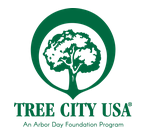Become a Tree City USA

Is your community a Tree City? What does that mean and how can you get it to become one? About 35% of New Hampshire residents live in a Tree City USA community. This program, started by the Arbor Day Foundation, provides incentives for towns and cities to look after their urban trees and provide greater natural benefits to their populations.
The program was started in 1976 to help inspire communities all over the country to realize and support the importance of trees in not only town planning, but maintenance as well. Once a town or city meets the criteria, they are sent signs, flags, and press releases that they can use to publicize their status. That's right, your small town can also qualify to be a Tree City. It is all about your community no matter what size, recognizing the importance of its trees and forests. Let’s use Concord, one of the 17 Tree City communities in NH, as an example. It culminates with the statement “The Arbor Day Foundation has named Concord, NH a Tree City USA Community in honor of the city of Concord’s dedication to forestry management.”
It begins with the dedication of a town or city to meeting the four criteria of a Tree City. Using Concord as an example once again, the four standards are:
- Maintaining a tree board or department
Concord has a general services Sustainable Street Tree Program in their public works department, where residents can request to have the city plant an approved tree in their front yard in the spring. The owner pays for the tree, but the city plants it for free. It is then the resident’s responsibility to maintain the tree.
- Having a community tree ordinance
Concord has a street tree policy in its Title 1 General Code, Article 5-6, Trees.
- Spend at least $2 per capita on urban forestry
Concord plants 25 to 30 trees per year throughout the town.
- Celebrate Arbor Day
Each year, Concord has a celebration in Kimball Park. This year a tree was planted there on April 28 that was donated by Concord business Modern Woodmen Fraternal Financial.
Trees reduce residential energy use by 7.2% and can lead to an annual savings of $100 for an average household. Trees reduce “hot spots” – neighborhoods with trees are seven to nine degrees cooler than those without. That can make a big difference on an 86 degree day! Trees also absorb the sounds of traffic by 40%, so having one in your front yard makes your dwelling that much quieter. It has also been shown that green spaces help improve physical and mental health, which in turn benefits the entire community. And when it comes to managing climate change, trees absorb and store carbon dioxide, and produce oxygen, which is good for the whole planet.
The communities in New Hampshire that are currently named as Tree Cities USA are Concord, Nashua, Manchester, Portsmouth, Franklin, Lebanon, Enfield, Exeter, Somersworth, Rochester, Dover, Durham, Hanover, Keene, Plymouth, New London, Newbury, Laconia and Wolfeboro. If your town is not listed, click here to learn how you can advocate for your own community’s Tree City recognition!
